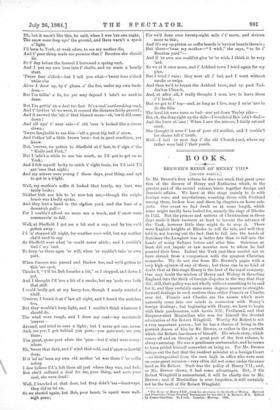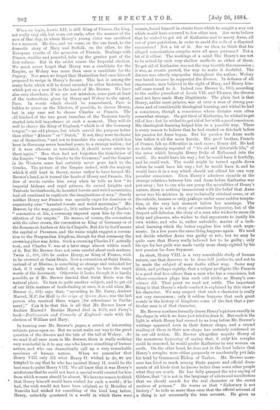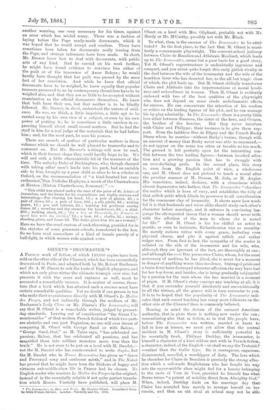BOOKS.
BREWER'S REIGN OF HENRY VIII.* [SECOND NOTICE.] IN Mr. Brewer's first .volume he does not reach that great ques- tion of the divorce of Henry and Katharine which, in the greater part of the second volume, binds together foreign and domestic affairs. We have at this stage mainly to do with foreign wars and negotiations, counting those with Scotland among them, broken here and there by chapters on home sub- jects. One event we find dwelt on at some length, which some might hardly have looked for, namely the siege of Rhodes in 1622. But the princes and natiobs of Christendom in those days made it their business at least to lament the advance of the Turk, however little they might do to stop it. There were English knights at Rhodes to tell the tale, and well they told it, not leaving out the fact that to fall into the hands of Suleiman the Lawgiver was a better fate than to fall into the hands of many Sultans before and after him. Suleiman at least did not impale or saw asunder men to whom he had granted their lives. Indeed the Turk just then needed not to have shrunk from a _comparison with the greatest Christian monarchs. We do not rise from Mr. Brewer's pages with a very high opinion of any of them ; but there can be no kind of doubt that at this stage Henry is the best of the royal company. One may doubt the wisdom of Henry and Wolsey in thrusting England into the thick of foreign disputes in the way that they did; still, their policy was not wholly without something to be said for it, and they certainly came some degrees nearer to straight- forward dealings in such matters than either Francis or Charles ever did. Francis and Charles are the names which most naturally come into our minds in connexion with Henry's foreign dealings ; but beginning with Henry, we have to begin with their predecessors, with Lewis XIL, Ferdinand, and that Emperor-elect Maximilian who won for himself the devoted admiration of Sir Robert Wingfield. Worthy Sir Robert is not a very important person ; but he has a chance of living in the portrait drawn of him by Mr. Brewer, or rather in the portrait which Sir Robert has drawn of himself. His whole story, which comes off and on through a great part of the first volume, is always amusing. He was a gentleman-ambassador, and he seems to have prided himself somewhat on being so. For Mr. Brewer brings out the fact that the resident minister at a foreign Court —as distinguished from the men high in office who were sent on some great occasion—very often did not come under the same head as Sir Robert. Such was the policy of Henry VII , and, as Mr. Brewer shows, it had some advantages. But, if Sir Robert Wingfield is remembered, it will be chiefly due to Mr. Brewer ; and if Maximilian is ever forgotten, it will certainly not be the fault of Sir Robert Wingfield.
• The Brion of Henry VIII., from hi. Accession to the Death of Wolsey. Revised and Illustrate-I from Original Documents by the late 1. 8. Brewer, MA. Edited by James Gairdner. In 2 vols. London: Murray. 1885.
When we begin, Lewis XII. is still King of France, the king, not really very old, but worn out early, after the manner of the men of that day, to whom Henry's young sister was sacrificed for a moment. He dies, and we come, on the one hand, to the domestic story of Mary and Suffolk, on the other, to the European results of the accession of Francis. Dealings with France, warlike and peaceful, take up the greater part of the first volume. But in the midst comes the Imperial election. We must never forget that Henry was a candidate for the Empire, as Wolsey was more than once a candidate for the Papacy. Nor must we forget that Maximilian had once himself proposed to resign in Henry's favour. This last is among the many facts which will be found recorded in other histories, but which put on a new life in the hands of Mr. Brewer. We have also seen elsewhere, if we are not mistaken, some part at least of the instructions given by Henry and Wolsey to the agent, Pace. In words which should be remembered, Pace is bidden to press on the Electors, if possible, to choose Henry, but in any case not to choose Charles or Francis. The old kindred of the two great branches of the Teutonic family started into full importance at such a moment. They will do well to choose the King of England, "which is of the Germany tongue,"—an odd phrase, but which served the purpose better than either "Almain " or " Dutch." If not, they were to choose one of themselves, "and not to translate the empire, which has been in Germany seven hundred years, to a strange nation ; for if it were eftsoons so translated, it should never return to them again." Men then had not forgotten the translation of the Empire "from the Greeks to the Germans," and the Empire in its Western sense had certainly never gone back to the Greeks. The picture of the Empire indeed, with the majesty which it still kept in theory, seems rather to have turned Mr. Brewer's head, as it turned the heads of Henry and Francis. His flow of words carries him away when he tells us how "its imperial bishops and regal princes, its sacred knights and Teutonic brotherhoods, its haunted forests and weird mountains, had all combined to captivate the imaginations of men." Surely neither Henry nor Francis was specially eager for dominion or superiority over "haunted forests and weird mountains." Mr. Brewer, by the way, speaks.(i., 364) rather hurriedly of Charles's "coronation at Aix, a ceremony imposed upon him by the con- stitution of the empire." He means, of course, the coronation with the silver crown, the coronation as King of Germany or of the Romans at Aachen or Aix-la-Chapelle. B ut Aix by itself means the capital of Provence, and the name might suggest a corona- tion to the Burgundian kingdom, though for that ceremony the crowning place was Arles. Such a crowning Charles IV. actually took, and Charles V. was at a later stage almost within reach of it. But Mr. Brewer does not seem careful about such matters. Twice (i., 498, 510) he makes Henry, as King of France, wish to be crowned at Saint Denis. Now a coronation at Saint Denis, instead of at Rheims, is something so strange and unlooked for that, if it really was talked of, we ought to have the exact words of the document. Otherwise it looks, though it is hardly possible, as if Mr. Brewer fancied that Saint Denis was the natural place. To turn to quite another subject, and to get rid of our little matters of fault-finding at once, it is odd when Mr. Brewer (i., 491) says that, "according to Mr. Parry, Andrew Marvel, M.P. for Hull in the reign of Queen Anne, was the last person who received these wages [for attendance in Parlia- ment]." Can it be that this is all that Mr. Brewer knew of Andrew Marvel ? Besides Marvel died in 1678, and Parry's book—Parliaments and Councils of England—ends with the election of William and Mary.
In turning over Mr. Brewer's pages, a crowd of interesting subjects press upon us. But we must make our way to the great question of the divorce and the tale of the fall of Wolsey-. As we read it all once more in Mr. Brewer, there is really nothing very wonderful in it to any one who knows something of human nature, and who can dramatically call up a very remarkable specimen of human nature. When we remember that Henry VIII. only did what Henry II. wished to do, we are tempted to say that he who has painted Henry II. would be the best man to paint Henry VIII. We all know that it was Henry's misfortune that he could not have a special world created for him from which women should be absent. We have no reason to think that Henry himself would have wished for such a world ; if he had, the wish would not have been original, as Q. Metellus of Nnmidia had wished for something of the kind long before. Henry, unluckily quartered in a world in which there were
women, found himself in straits from which he sought a way out which would have occurred to few other men. Are we to believe that he wished to get rid of Katharine and to marry Anne, all out of pure patriotism, in order to avoid the evils of a disputed succession ? Not a bit of it. Are we then to think that his alleged conscientious scruples were all mere pretence ? Not a bit of it either. The workings of a mind like Henry's are not to be solved by such very shallow methods as either of these. To get rid of Katharine was not the way to settle the succession ; it was, as events proved, the way to make it doubtful. The divorce was utterly unpopular throughout the nation ; Wolsey was hated because he supported the divorce. In defiance of all enactments, men believed in the right of Mary, and Henry him- self came round to it. Indeed (see Brewer ii., 165), according to the earlier precedent of Lewis VII. and Eleanor, the divorce need not have made Mary illegitimate. The plain fact is that Henry, unlike most princes, was at once a man of strong pas- sions and of considerable theological learning, and withal he had a conscience, though a conscience whose dictates were often somewhat strange. He got tired of Katharine, he wished to get rid of her ; but he wished to get rid of her with a good conscience. His theological learning helped him to a possible way. There is every reason to believe that he had started on this tack before his passion for Anne began. But his passion for Anne made him follow it all the more keenly. His good brother, Francis of France, felt no difficulties in such cases ; Henry did. He had no doubt already repented of "his old and detestable life," of the error which brought Henry Duke of Richmond into the world. He would have his way ; but be would have it lawfully, and be could wait. The world might be turned upside down before he could have his way ; but he would have it, and he would have it in a way which should not offend his own very peculiar conscience. Even Henry's admirers stumble at the strange relations between him and Anne before Katharine was put away ; but to one who can grasp the specialities of Henry's nature, there is nothing inconsistent with the belief that Anne never was his mistress in any technically criminal sense, or at the outside, became so only, perhaps under some sudden tempta- tion, at the very last moment before her marriage. The whole story is not a story of conscious hypocrisy, but of the deepest self-delusion, the story of a man who wishes to recon3ile duty and pleasure, who wishes to find arguments to justify his own wishes, and who is, rather unluckily, master of a tech- nical learning which the better supplies him with such argu- ments. In a few years the same thing happens again. We need not decide whether Anne was guilty or not ; but we may be quite sure that Henry really believed her to be guilty ; only his eye for her guilt was made vastly more sharp-sighted by his new passion for Jane Seymour.
In short, Henry VIII. is a very remarkable study of human nature, one that deserves to be done full justice to, and not to be made the subject of mere daubs either way. Some may think, and perhaps rightly, that a vulgar profligate like Francis is a good deal less odious than a man who has a conscience, but whose conscience plays him such odd tricks as Henry's con- science did. That point we need not settle. The important thing is that Henry's whole conduct is explained by this view of his character. We may suspect that such a character is really not very uncommon ; only it seldom happens that such great events in the history of kingdoms come of the fact that a par- ticular man is of that character.
Mr. Brewer nowhere formally draws Henry's Picture exactly in the shape in which we have just tried to draw it. But such is the light in which Henry had seemed to us long before Mr. Brewer's writings appeared even in their former shape, and a second reading of them in their new shape has certainly confirmed us in our old notion. Mr. Brewer altogether acquits Henry of the monstrous hypocrisy of saying that, if only' his scruples could be removed, he would prefer Katharine to any woman on earth. On the other hand, he does not in the least believe that Henry's scruples were either purposely or accidentally put into his head by Grammont Bishop of Tarbes. Mr. Brewer more- over has lived so much among State papers and official docu- ments of all kinds that he knows better than some other people what they are worth. He has fully grasped the wise saying of Gibbon, that "it is not in the language of edicts and manifestoes that we should search for the real character or the secret motives of princes." He warns us that "diplomacy is not history ;" he tells us more than once that the official account of a thing is not necessarily the true account. He gives us
another warning, one very necessary for his times, against an error which has misled many. There was a fashion of laying before the Pope ready-made documents, which it was hoped that he would accept and confirm. These have sometimes been taken for documents really issuing from the Pope, and strange inferences have been made. In short, Mr. Brewer knew bow to deal with documents, with public
acts of any kind. Had he carried on his work further, he might have found evidence to convince him either of the guilt or of the innocence of Anne Boleyn ; he would
hardly have thought that her guilt was proved by the mere fact of her conviction. And while he knew that official documents have to be weighed, he knew equally that popular rumours preserved to us by contemporary chroniclers have to be weighed also, and that they are as little to be accepted without examination as the official documents themselves. He knew that both have their use, but that neither is to be blindly followed. Mr. Brewer, in short, understood the nature of evid- ence. He was, we think, a little impulsive, a little apt to be carried away by his own view of a subject, or even by his own power of putting it ; he is sometimes a little careless in ex- pressing himself about small casual matters. But he had the stuff in him for a real judge of the materials that he had before him ; and, for the most part, he uses his powers.
There are crowds of .notices of particular matters in these volumes which we should be well pleased to transcribe and to comment on. But Mr. Brewer's writings will now be read, which in their former shape they could hardly hope to be. We will end with a little characteristic bit of the manners of the time. The unlucky Duke of Buckingham, who, though charged with taking other men's lands into his park, had an amiable side to him, brought up a poor child as alms to be a scholar at Oxford, on the recommendation of "a kind-hearted but crazy enthusiast:Dan Nicholas Hopkyns, a monk of the Charterhouse at Henton [Hinton Charterhouse, Somerset] " :—
"This child was placed under the care of the prior of St. John's of Jerusalem, and the items for his expenditure are highly curious and interesting,—For shaving his head, ld.; a pair of gloves, 2d. ; a pair of shoes, Gd.; a pair of hose, 10d.; a silk girdle, 6d.; writing paper, ld. ; pen and inkhorn, 2d. ; washing his petticoat sundry times, 3d. ; mending and dry-scouring his kendal-coat, Gd. ; a shirt, 20d.; walking shoes, 8d. ; for a hen at Shrovetide, for Francis to sport him with the childer,' 7d.; a bow, Gd.; shafts, 3d. ; strings, shooting glove, and brace 3d. The Duke gives him 40s. as a reward."
Here we have the cruel custom of cock-throwing, provided for in the statutes of some grammar-schools, transferred to the hen.
So we have read somewhere of a kind of female parody of a bull-fight, in which women rode against cows.




































 Previous page
Previous page